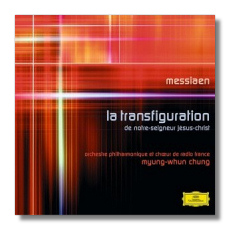
The Internet's Premier Classical Music Source
Related Links
- Messiaen Reviews
- Latest Reviews
- More Reviews
-
By Composer
-
Collections
DVD & Blu-ray
Books
Concert Reviews
Articles/Interviews
Software
Audio
Search Amazon
Recommended Links
Site News
 CD Review
CD Review
Olivier Messiaen

La Transfiguration de Notre-Seigneur Jésus-Christ
Roger Muraro, piano
Orchestre Philharmonique et Chœur de Radio France/Myung-Whun Chung
Deutsche Grammophon 471569-2 DDD 2CDs: 35:03, 64:44
Having recorded several of Messiaen's other major orchestral works (Turangalîla, most notably), it was only inevitable that Chung would get around to La Transfiguration. The time is right, as Doráti's (Decca) and De Leeuw's (Disques Montaigne) recordings are difficult to find; Rickenbacher's (Koch-Schwann) may be more readily available, at least in the United States, but he doesn't grasp the Messiaenic idiom as thoroughly as Chung does (neither does Doráti, in his 1975 recording from Washington, D.C.; I haven't heard De Leeuw, so I can't comment about his).
La Transfiguration was begun in 1965, while Messiaen was still in his fifties. In some ways, it is a fine synthesis of much of his earlier work. Bird-song is riotously present, as is the fine choral writing of Cinq rechants, the eternal meditations of Quartet for the End of Time, the orchestral power of Turangalîla, and the percussion writing of the Sept Haikai. The theme is Christ's transfiguration – and all the light and fearful ecstasy which it represents – and "filiation," the word used to describe God's paternal love for mankind, as it is mediated by his own Son. The work, which resembles an oratorio more than any other work by Messiaen, is in two parts ("septenaries") of seven sections each. The chorus sings in all fourteen sections, but from section to section, there is considerable variation in both the choral and the instrumental textures. It is a long work, and it requires more stamina and self-discipline from the listener than the intoxicating Turangalîla. La Transfiguration fills those who hear it with awe and fear, as any sudden, bright light would, but its light burns away the world's impurities. In his booklet note, Paul Griffiths rightly calls it "extravagant, even bizarre," continuing, "it is the invention of a surrealist." In modern music criticism's haste to recognize Messiaen the Catholic, Messiaen the radical shaper of dreams – and not always easy ones – sometimes has been forgotten.
Earlier recordings included pianist Yvonne Loriod, Messiaen's wife; preferring her has more to do with sentiment than with actual musical considerations. In any event, Muraro is just fine in the difficult piano part. The percussionists play with wrists of iron, and the chorus ranges from single-minded implacability to the most shivery haloes of sound. The orchestra surpasses its predecessors on disc as well, but what really makes this CD special is Chung's understanding, his devotion, and his faith in the composer, who never makes a false move, as outlandish as some of his music is. Chung is the finest Messiaen conductor today, although I think Kent Nagano could give him a run for his money. (Nagano, by the way, recently played this work in Berlin, and it wouldn't surprise me if he recorded it.)
Appropriately, these discs were recorded in Radio France's Salle Olivier Messiaen. The sonics are stunning – try the percussion in the first movement and see if you're not impressed.
Copyright © 2002, Raymond Tuttle


















